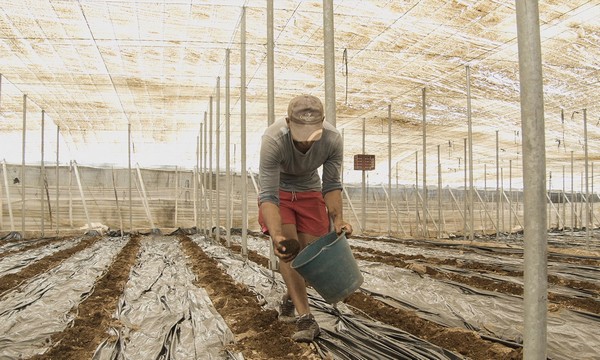Soil is essential for soil-bound horticulture. It’s not only the place where the plant roots develop and which contains the nutrients; it also hosts many microorganisms on which plant health depends.
The soil itself forms an entire ecosystem with a great biodiversity, which is why the use of chemical products is avoided in environmentally-friendly agriculture by resorting to sustainable solutions that will yield effective results and protect the quality and fertility of the soil, and vermicompost has shown to be a great alternative.
“Instead of having to use potassium nitrate or a chemical fertilizer to supply nitrogen to the soil, vermicompost provides bacteria that are able to dissolve the nitrogen already present in the soil from the over-fertilization of decades past,” says Enrique Cat, of Nostoc Biotech, a Spanish company that is specialized in the development of environmentally-friendly products for (hobby) horticulture.” In any case, the application of this natural solution does not only have a fertilizing effect,” he says.
“We also provide the grower a tool to fight diseases by strengthening the immune system of the crops with micro-organisms, starting with the soil. Both with soil treatments and foliar treatments, we control very difficult to control pests, such as spider mites, aphids and thrips. To this end we have a completely organic, residue-free product which can also be used in combination with auxiliary fauna,” says Enrique. “Ultimately, vermicompost is just another tool in the integrated crop protection strategy, which aims to reduce the use of chemicals.”
Also, the use of chemical fertilizers can change the pH of the soil. By changing the medium in which the roots of the plants develop and in which microorganisms live, the plant is prevented from absorbing sufficient nutrients and fungi and pathogenic bacteria can multiply. “This ultimately makes the soil sterile; the exact opposite of what we are looking for, which is a healthy soil that recovers its natural properties.”
Nostoc Biotech, together with the cooperative CASI, the growers’ association MABE and the University of Almería, has participated in a research project that has shown that the use of vermicompost can help reduce fertilizer use in horticulture by up to 20%.
The results of the study also reveal that vermicompost increases the yield and quality of the crops. “One of the statistics that stood out the most in the trials we carried out in Almería is that the Brix of the fruits increased by 3 to 7 percent. The latest figures also show an increase in the weight of Class I fruits and vegetables,” says Enrique Cat.
The company produces and sells vermicompost, both solid and liquid, in addition to a range of microbiological products for horticulture suited for every kind of crop, from greenhouse and open ground vegetables to soft fruit, citrus or olives. “At the moment, we have a lot of demand from large growing companies in both Murcia and Almería; however, Nostoc Biotech is constantly expanding and we are therefore still looking for additional distributors.”
For more information:
Enrique Cat
Nostoc Biotech
María Pedraza 30,
28039 Madrid, Spain
Tel: +34 91 290 52 89
Mob: +34 679 11 09 41
enrique@nostoc.es
www.nostoc.es











